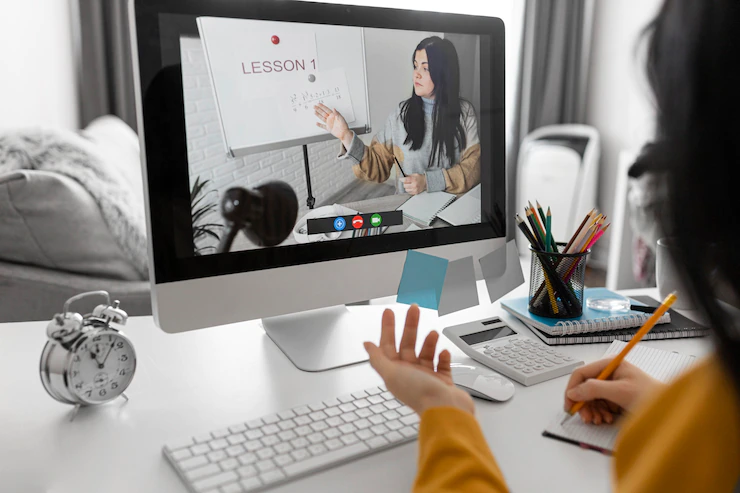How To Make Your Online Learning Experience More Effective
by Abdul Aziz Mondal Technology Published on: 16 December 2022 Last Updated on: 04 March 2025

Online learning has exploded in popularity over the last few years, with organizations choosing to offer learning through e-learning platforms. It has opened the door to education for millions worldwide, enabling them to improve their skills and career prospects.
For instance, online learning offers countless benefits to learners and trainers. These benefits include reduced cost and time commitment, improved learner experience, more flexibility and convenience, and better engagement. Plus, for those looking for something to show at the end of their course, it’s even possible to find options like this online medical terminology course with certificate that offer a certificate upon successful completion.
However, with so many courses and things to learn, it can be hard to know where to start or spend your time. It is therefore essential to consider what you want to achieve when undertaking an online course.
With that in mind, you can take measures to make your online learning experience as enjoyable and successful as possible. This article offers simple tips to help you make the most of your online learning experience and guarantee its success.
What is an online learning experience?

An online learning experience refers to any type of formal or informal education conducted in an online environment. Unlike traditional brick-and-mortar classrooms, this form of education does not rely on the instructor being physically present at all times.
Instead, students can participate in courses and seminars with other participants worldwide through various mediums, including email, chat rooms, blog posts, videoconferencing, and podcasts.
Online learning offers students the flexibility to study at their own pace and from the comfort of their own homes. To be successful, online learners need to be self-motivated and organized.
Some online learning experiences are highly structured and offer a lot of interaction with instructors and classmates. In contrast, others are more independent and allow you to learn at your own pace.
No matter what type of online learning experience you’re looking for, there are a few things you can do to ensure that you get the most out of it.
How to take online classes: a step-by-step guide
Online classes can be a great way to learn new things and improve your skills, but it’s essential to make sure that you get the most out of your experience. Follow this step-by-step guide to learn how to take an online class to help make your learning experience as seamless as possible.
Select the study area that interests you

Whether you’re looking to learn a new skill or complete a degree, taking an online class is a great way to fit education into your busy life. The first step towards achieving this goal is choosing your preferred study topic.
Are you interested in management? Do you have a passion for fashion design? Whatever it may be, many classes are available on any number of topics and fields of study.
Take some time to browse the different courses offered by reputable universities until you find one that fits your goals. For example, online courses would allow you to build your knowledge and credentials in patient-centered care.
You can typically complete these courses at your own pace within the set timeframe. Students can access all the coursework from anywhere via the internet.
Research online courses on your chosen topic
After selecting your preferred study topic, research the available courses. Read reviews and testimonials from students who have taken these classes before you enroll in one.
Be sure to look for certifications, degrees, costs, and time commitment to decide which course will be best for you.
Also, check to see if the course is still on offer and if there are any upcoming deadlines. You can select the most appropriate course and confidently register for it.
Properly review the course material

Before enrolling in an online class, it is vital to check the course content thoroughly. This assessment includes reading the syllabus, viewing the lectures and readings, and reviewing the assignments.
The syllabus can include information on the instructor’s teaching style, required books, whether attendance is required or not, etc. By doing this, you can be sure that the class is a good fit for you and that you will be able to complete the work.
Analyze the course’s level of interaction and participation
After reviewing the course content, you should assess how much interaction and engagement there is in the course.
For example, a massive open online course (MOOC) will have little or no instructor involvement outside of videos already posted on YouTube. Other courses may require discussion boards and Skype chats with the professor.
If you need interactive contact with classmates or instructors, make sure that this is available before enrolling in the course. Otherwise, you might feel lonely and isolated when participating in the course.
Check if the course is flexible

One of the great things about online courses is that they are usually very flexible. Flexibility means that you can study at your own pace and in your own time.
However, before you enroll in an online course, it is vital to check the requirements to ensure that you can complete the course. For example, for a part-time degree program, many schools will have restrictions on how many hours per week you can work or other restrictions on employment.
It is also essential to determine if there are deadlines for assignments and whether or not attendance is required. With that information, you should be able to decide if the course is right for you.
Compare competitor options
Once you have verified these factors, it is time to compare your options. The key here is to find a reputable school with a program that matches your interests and needs.
Another way to help guarantee quality education is by researching faculty bios. You can also get feedback from students who have taken classes.
By comparing, you can see the courses on offer, if there are any prerequisites for admission or courses, and how long it will take to complete your degree.
Gather materials and prepare your study area

Before taking an online class, you’ll need to ensure that you have the proper setup. First, you’ll need a quiet study space where you won’t be interrupted.
You’ll also need a reliable internet connection and a computer or laptop to handle video streaming. Finally, get hold of any supplies you might need, such as notepads and pens. The aim is to create a work environment that is conducive to learning.
Engage in active learning
As soon as you begin your online course, read the syllabus and contact the professor if there are any questions. Schedule a time for weekly check-ins with your professor, and attend each meeting.
Additionally, work on assignments as they arise so that you don’t forget about them or procrastinate. The more interactive the project is, the more likely it is that there will be a discussion forum or chat room where you can collaborate with other students.
These active learning techniques help you stay on top of your classes and learn better.
Benefits of online classes
The following are reasons why you should enroll in an online class today.
Offers flexible schedule
Learning in your own time is one of the most significant advantages of online classes. Whether a night owl or an early bird, you can study when it’s most convenient.
Do you have a busy work schedule? No problem. Do you need to take care of your kids during the day? That’s not an issue either. Online classes allow you to study whenever and wherever works best for you.
Eliminates the necessity to commute

Online classes provide the perfect solution if you have a hectic schedule or live far from campus.
A student won’t have to worry about fighting traffic or finding a parking spot. You can attend class from the comfort of your own home.
Provides opportunities for skill development
In an online class, you have the opportunity to learn new skills that can help you both in your career and personal life.
For example, you can learn how to use new software, improve your writing skills, or better manage your time. That way, you’ll be able to build your knowledge and work on improving other areas of yourself.
Amazing networking opportunities

Regardless of your field, there’s a good chance that you can find an online class to help you meet people in your industry and learn more about what you love.
Networks can help you establish contacts with other professionals in the industry or become acquainted with potential employers that might not be available on campus.
Tips and tricks to maximize your online learning experience
Online learning is one of the most efficient ways to accelerate career growth, save time and money, and gain valuable skills. Follow these tips and tricks to maximize your online learning experience and make the most of everything it offers.
Plan ahead

Planning is essential whether you’re starting a new online course or trying to get ahead in your current one. Proper planning ensures that you have all the materials and that you download the necessary software on your computer, and that there are no time conflicts with other commitments.
It also helps prevent procrastination and distractions so that you can stay focused on your learning objectives for the semester. To plan better, make sure that you know what assignments and projects are due each week or each month.
This action enables you to avoid late nights at the library scrambling to find information. You’ll also avoid frantically searching for resources while your paper is due in the morning.
Additionally, you’ll feel more prepared when you don’t have as much anxiety about how much work you still need to do. Generally, having a plan will help you save time, which might reflect positively on your overall performance.
Keep track of your learning process

If you’re like most people, you probably have a lot of commitments and responsibilities. That’s why it’s essential to keep track of your learning process.
Doing so means that you’re making the most of your time and not letting anything slip through the cracks. For example, if you need to take notes, take screenshots, or use an online note-taking tool to help organize your thoughts and keep everything organized.
Other methods to track your learning process include creating a checklist and setting up reminders for when you need to start studying. Some apps also allow you to keep tabs on your progress with tests and quizzes, making it easier to see how well you know a topic.
That way, you’ll be able to focus on what needs more attention rather than wasting time figuring out what might be due tomorrow. It may seem daunting at first, but once you use these tools, they will become second nature.
Network and form connections

Networking and connecting with other learners is a great way to expand your knowledge and skills. One way to network is to join online learning communities, which you can find on social media sites such as Facebook, Twitter, or blogs.
You may also be able to join virtual groups where you can have discussions with other learners. Joining the global community of people who want to learn something new will open up opportunities for you that you never knew existed.
It’s important to remember that not everyone will be at the same level as you, so don’t get discouraged if you feel that people are doing things better than you.
Collaborate with other learners

Collaboration refers to two or more people who work together on a project. With online learning, you can learn from others and vice versa.
For example, if you have a difficult question and someone else does, you can help each other answer it. Another example is when one person finds an exciting resource that the other person doesn’t know about. You can share it with them so that they don’t have to spend their time looking for it. That way, everyone will be able to grow at their own pace, and everyone will benefit from the group’s skills.
One strategy is to use platforms where users can ask questions and receive answers in different categories. Another approach is to follow various educational channels on social media.
These platforms offer plenty of great opportunities for discussion around specific topics. Whichever method you use, ensure that collaboration with others is part of your learning strategy.
Improve knowledge retention

When trying to learn something new, it’s crucial to have a strategy to help you retain the information. For instance, if you are reading articles or listening to podcasts, create a note-taking system to organize your thoughts and not miss anything.
It would be best if you also read through an introduction to the material before diving into it to know what to expect and plan accordingly. If possible, break up large tasks into smaller ones, making them seem less intimidating and more manageable.
Taking breaks throughout the day gives your brain time to process information and connect different concepts.
Finally, try using mnemonic devices such as acronyms, mnemonics, or rhyming words when studying topics that involve abstract concepts. That way, you’ll be able to remember facts easily without studying all the details repeatedly.
Practice time management

The most important skill you can have when learning online is time management. If you can’t manage your time, you’ll never be able to keep up with the material.
Plan how much time you want to spend on each task, and stick to it. It’s also good to schedule downtime between classes so that your brain can process everything that you’ve learned in that session.
Take this break as an opportunity to take care of any personal errands, such as grocery shopping or going for a run. Time management will ensure that you’re not overloaded with work and feeling overwhelmed.
Have a dedicated study space

One of the best ways to maximize your online learning is to have a dedicated study space. It can be a corner in your bedroom, a kitchen table, or even a dedicated desk in your home office.
By having a dedicated space for learning, you can help yourself focus and stay on task. Additionally, keep this space clutter-free and stocked with any supplies you might need, such as pens, paper, and highlighters.
Don’t forget to make it comfortable. You’ll want your space to be inviting so that you’re eager to spend time there.
Frequent contact with your trainer

Whether through email, video chat, or even phone calls, staying in touch with your trainer will help ensure that you’re on track and progressing. Frequent contact will mean that you’re on the same page and that your trainer can help keep you accountable.
Additionally, your trainer can answer questions and give feedback on your progress. When you need a little guidance, they will be there to answer any questions you might have.
Also, if you ever need to miss an appointment, they will be more than happy to fill in the gaps so that you don’t lose any session.
Wrapping up
Online learning is a great way to enhance your current education and make it more affordable. However, with so many options available, it can be hard to know where to start.
By implementing these tips, you can create a better online learning experience for yourself. They will help you stay on task and focused and keep you from feeling overwhelmed. That way, you can reduce distractions and increase your productivity.
Additional:



































































































